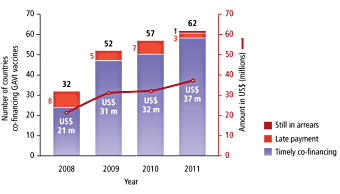
Despite the impact of the ongoing global financial crisis, more GAVI-eligible countries than ever are contributing a share of their vaccine costs, underlining the growing commitment to health and immunisation.
Since 2008, the number of countries required to co-finance new and underused vaccines supplied by GAVI has nearly doubled from 27 to 62 in 2011.
Sustainability
GAVI's co-financing policyA 2010 review of GAVI's successful co-financing efforts, in close consultation with ministries of health and finance in implementing countries, led to a revision of its policy. GAVI's new strategy requires economically stronger countries to co-finance a higher share of vaccine costs, easing their transition to graduation from GAVI support and preparing them for taking on the full cost of vaccines. |
By requiring low-income countries to fund a portion of the introduction of vaccines themselves, GAVI's co-financing policy, unique amongst international development agencies, aims to ensure countries can eventually sustain their immunisation programmes without external support.
Co-financing levels are determined by each country's expected ability to pay, with countries divided into low-income, intermediate and graduating groups. As countries approach graduation, co-payments will gradually increase to cover the full cost of vaccines.
Rapid progress
In 2011, six countries - Afghanistan, Bhutan, Bolivia, Rwanda,Sierra Leone and Solomon Islands - paid more than required and are thus progressing more rapidly towards financial sustainability.
Additionally, seven countries four countries - Eritrea, Mongolia, Papua New Guinea and Yemen - have showed their high commitment by co-financing ahead of the required start date.
In total, co-payments in 2011 amounted to US$ 37 million, representing 8% of total GAVI vaccine support to the co-financing countries.
